|
|
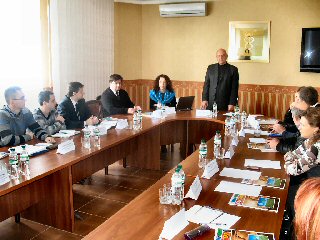 The second creative workshop "Creating of scenario for development
of the city heating system of Bila Tserkva till 2025 using
the backcasting method" planned within the frameworks of ERAIHM project
was held on November 9, 2012 at Kyiv Regional Chamber of Commerce and
Industry. Its main goal was to determine the strategic model for
development of the city heating network with taking into account the
conclusions of experts-analysts regarding the present state and structure
of this system.
The second creative workshop "Creating of scenario for development
of the city heating system of Bila Tserkva till 2025 using
the backcasting method" planned within the frameworks of ERAIHM project
was held on November 9, 2012 at Kyiv Regional Chamber of Commerce and
Industry. Its main goal was to determine the strategic model for
development of the city heating network with taking into account the
conclusions of experts-analysts regarding the present state and structure
of this system.
From the city community of Bila Tserkva, the representatives of different
stakeholders have taken part in the workshop:
-
 Vice-Major of the city of Bila Tserkva Gennadii Dzhegur,
Vice-Major of the city of Bila Tserkva Gennadii Dzhegur,
-
from Public Utility Company "Bilotserkivteplomerezha" (Heating Networks
of Bila Tserkva): Vitalii Chernenko (Director) and Sergii Fursenko (Chief
Engineer),
-
from Administration for Housing and Communal Services: Eugene Sinchuk (1st
Vice-Director) and Oleg Savchenko (Vice-Director for Housing Exploitation
Services),
-
from Public Utility Company "Bilotserkivvodokanal" (Water Supply Company
of Bila Tserkva): Yurii Yurenko (Chief Power Engineering Specialist) and
Tetyana Boiko (Chief Economist),
-
from Administration for Urban Planning and Architecture:
Olexandr Golub (Vice-Director), Tetyana Derkach (Chief of Department for
Urban Design, City Art Director) and Dmitro Bondarenko (Specialist),
-
form Economic Administration: Olena Shapoval (Chief of Department for
Industry, Energy, Transport and Communication),
-
from Private JSV "Bilotserkiv'ska TEC" (Heat Electric Central of Bila Tserkva):
Eugene Zapasny (General Manager), Andrii Suraev (Chief of the Exploitation
Department), Nadiya Pletyanaya (Chief Economist),
-
from JV "Ukrinterm" Co Ltd: Sergii Yuzvak
от ООО СП "Укринтерм" - Сергей Юзвак (Technical Director) and Stanislav
Shmulyov (Combustion Engineer),
-
from NGOs: Head of Public Organisation "Ayurveda" Valerii Pan'ko,
Heads of Communities of Co-Owners of Multifamily Housing Svitlana
Osaulenko and Nataliya Levandyuk.
The researchers at the workshop were represented by:
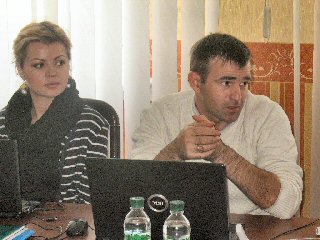
-
from the Royal Institute of Technology, KTH (Stockholm, Sweden):
Dr. Olga Kordas and Postgraduate Tatyana Spitsyna,
-
from the Institute of Hydromechanics of NAS of Ukraine: Corresponding
Member of NASU Prof. Eugene Nikiforovich, Dr. Valery Oliynik and
Postgraduate Roman Bobruiko,
-
from the National Technical University of Ukraine "KPI": Postgraduates
Katerina Pereverza and Olexiy Pasichny,
-
from the National University of Water Management and Nature Resources
Use (Rivne, Ukraine): : Dr. Volodymyr Voloschuk.
The working session was opened by Prof. Eugene Nikiforovich. After the
introductory remarks by the City Vice-Major Gennadii Dzhegur to
participants, Dr. Olga Kordas has informed the auditory about the schedule
and told in brief about the new projects in area of energy efficiency
started under the aegis of the governmental organisation Swedish Institute
(Si). Also, she has reminded about the specifics of the backcasting
methodology implying the "inverse" constructing of the perspective
development scenarios: from desirable final vision to the present state.
An expert-analyst Katerina Pereverza has acquainted everybody with
detailed picture of the present state of affairs in heating system of Bila
Tserkva obtained in the result of processing of extended data set from
both the official and unofficial sources of different levels (the state
and city regulations, reports, interviews with the specialists, etc.).
In course of presentation, the representatives of different stakeholders
made a lot of important additions and corrections for many positions.
In general, the information from the experts has been regarded as quite
realistic one and entertained as the basic point for creating of
perspective scenarios.
 An expert-analyst Olexiy Pasichny has reported about main criteria and
driving forces extracted by the researchers that will condition the
scenarios to be developed. So, the driving forces, i.e., the factors of
maximal influence, were classified to predictable (trends) and
unpredictable ones (key uncertainties). Since currently and in the
nearest future the city heating system is essentially dependent from the
imported gas, the two key uncertainties were proposed for analysis:
An expert-analyst Olexiy Pasichny has reported about main criteria and
driving forces extracted by the researchers that will condition the
scenarios to be developed. So, the driving forces, i.e., the factors of
maximal influence, were classified to predictable (trends) and
unpredictable ones (key uncertainties). Since currently and in the
nearest future the city heating system is essentially dependent from the
imported gas, the two key uncertainties were proposed for analysis:
-
price for natural gas set for consumers,
-
priority of the governmental energy policy (stimulation of energy efficiency
or excessive consuming).
From the structural point of view, the scenarios were constructed basing
on three factors:
-
a degree of centralisation (technical linking of the network),
-
diversification of resources (if only traditional hydrocarbon fuels are
used, or also the alternative renewable resources),
-
patterns of ownership for heating system (from the point of view of
influence of the city community).
As a result of estimations made by the experts together with the
stakeholders, the two scenarios have been selected:
-
"Stockholm" - the system with high degree of centralisation using both the
traditional and alternative types of fuel with shared ownership when the
significant its part is kept belonging to the city,
-
"Ecovillage" - predominantly decentralised system for individual heating
and cooling with private ownership.

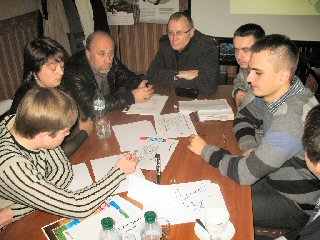
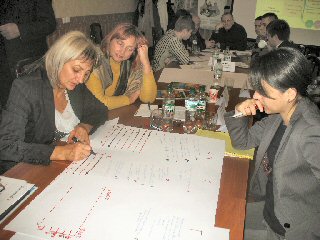
In course of discussion, it was mentioned that though the first scenario
provides the maximal efficiency, it cannot be implemented "as is" in
actual conditions of Bila Tserkva, where considerable part of the city is
occupied by the cottage-type private buildings. Therefore, for the
scenario being a combination of two above variants was chosen as the
base for future work.
It was noted that uncontrolled privatisation and concession of heating
networks may lead to collapse of heating system at whole, like it had
happened in the small cities of Estonia.
The rest of the workshop session was dedicated to business game
on testing of the selected scenarios for efficiency and key uncertainties,
as well as determining of the pathways for their implementation.
It should be mentioned that the ice of distrust has been broken
as far back as at our first meeting this May, so the floor has
heartily and enthusiastically got into gear.
It is interesting to note that different stakeholders granted different
assesses for scenarios robustness over the field of variation of key
uncertainties "price for gas / priority of energy efficiency",
substantiating them with convincing arguments. Also, the participants have
made an attempt to determine what should happen for realisation of
desirable scenario (implying the cultural, structural and technical
changes), what should be made for this and by which actors in the society.
Moreover, barriers and driving forces for the future changes were
described.

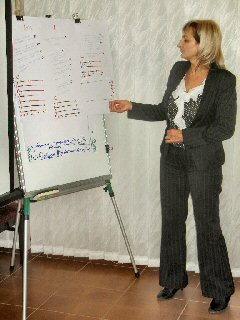 At the end of the workshop, the exchange by opinions about its course was
organised. It was mentioned that application of the modern European
techniques for strategic prognosing has allowed change the way of thinking
of many participants in decision-making practice.
At the end of the workshop, the exchange by opinions about its course was
organised. It was mentioned that application of the modern European
techniques for strategic prognosing has allowed change the way of thinking
of many participants in decision-making practice.
The results of the second creative workshop held in Bila Tserkva form the
foundation for an expert report in which the proposals on future
development of the city heating system for a period till 2025-2030 will be
defined in concrete terms.
|
|



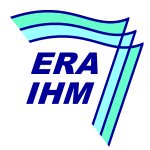
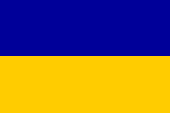 ERAIHM
ERAIHM

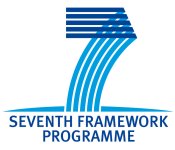





 ERAIHM
ERAIHM


